The Nova Scotia RCMP, in collaboration with IWK Child Safety Link, is urging parents and caregivers to prioritize child passenger safety by ensuring the right car seat is used at the right time for every ride.
"Choosing the right car seat is one of the most critical decisions you can make for your child's safety. A properly installed car seat tailored to your child's age, weight, and height drastically reduces the risk of injury in the event of a collision." says Sgt. Shawn Puddester, RCMP Traffic Services.
Right seat, right time, every ride:
- Rear-Facing Seats: It is recommended that children remain rear-facing for as long as possible, until they reach the maximum height or weight limits of the seat – typically well beyond two years of age.
- Forward-Facing Seats: Once a child outgrows their rear-facing seat, they should transition to a forward-facing car seat with a five-point harness until the child weighs at least 40lbs and is at least four years of age.
- Booster Seats: When a child has outgrown the forward-facing seat, they should move to a booster seat. The booster helps position the vehicle's seat belt correctly across the child's body. This stage should continue until the seat belt fits properly without a booster. Most children do not fit the adult seat belt safely without a booster seat until between 10 and 12 years old.
- Seat Belts: Once children are big enough to fit the vehicle's seat belt without a booster, they should always wear it correctly. The lap belt should sit low across the hips, and the shoulder belt should cross the chest, not the neck.
"Families want to know how they can best protect their children," says Katherine Hutka, Health Promotion Specialist for IWK's Child Safety Link. "We know that by properly buckling children into the right seat for their age and size, we can reduce the risk of death and serious injury by up to 70 per cent."
For more information on child passenger safety and how to select and install the right car seat, visit IWK Child Safety Link. Car seat and booster seat resources have been translated into additional languages including French, Mi'kmaq, Arabic, Mandarin Chinese, Nepalese, Ukrainian, Russian, Farsi, Dari, Somali, Swahili, and Tigrinya.
